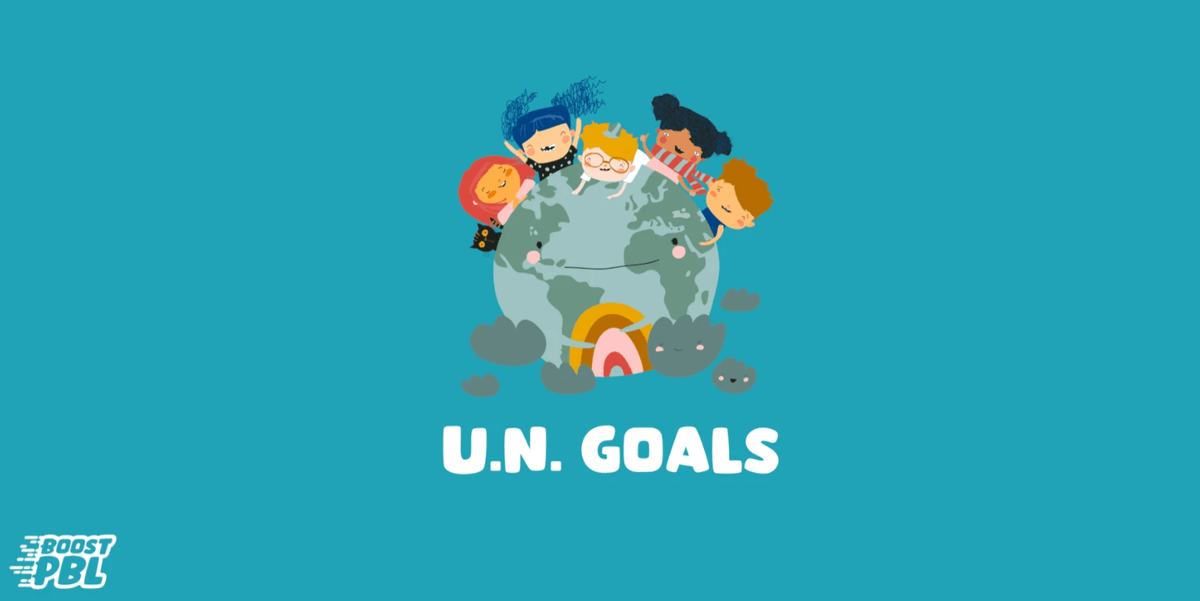
- Standards
- …
- Standards
- Standards
- …
- Standards
U.N. Goals PSA
3rd-5th or 6th-8th Full Project, Mini-Project, and Sprint

PBL Experience Overview
1. Project Summary
- Grade Levels: 3rd to 8th Grades
- Theme: Advocacy, Research, and Digital Media
- Objective: Students design a Public Service Announcement (PSA) about a United Nations (UN) Global Goal, focusing on raising awareness and promoting solutions. The PSA incorporates persuasive and narrative writing, supported by research, and is presented in a creative, shareable format.
- Duration:
- Full Project: 3 weeks, 30-45 minutes per day
- Mini-Project: 5-7 days, 30-45 minutes per day
- Sprint: 2-3 days, 45-60 minutes per day
2. Standards Alignment
NGSS Standards
- MS-ETS1-1: Define the criteria and constraints of a design problem to ensure a successful solution, considering scientific principles and potential impacts on people and the environment.
- Application: Students identify global challenges related to a UN Goal and define the parameters for an effective PSA.
- MS-ETS1-2: Evaluate competing design solutions using a systematic process to determine how well they meet the criteria and constraints of the problem.
- Application: Students compare approaches to communicating their PSA message for maximum impact.
- MS-ETS1-3: Analyze data from tests to determine similarities and differences among design solutions to identify optimal characteristics.
- Application: Students review PSA drafts to refine content and delivery for clarity and impact.
- MS-ETS1-4: Develop a model for iterative testing and modification of a process or design to achieve optimal results.
- Application: Students prototype, revise, and finalize their PSAs based on peer and teacher feedback.
Common Core ELA Standards
- Writing:
- W.6.2–W.8.2: Write informative texts to examine a topic and convey ideas clearly.
- W.6.4–W.8.4: Produce clear, coherent writing appropriate to the task, purpose, and audience.
- W.6.7–W.8.7: Conduct short research projects to answer a question or solve a problem.
- Reading:
- RI.6.1–RI.8.10: Analyze and evaluate informational texts to extract key details and integrate multiple sources.
- Speaking & Listening:
- SL.6.1–SL.8.6: Engage in collaborative discussions, present findings, and adapt speech to different contexts.
Common Core Math Standards
- Statistics and Probability:
- 6.SP.5–8.SP.4: Summarize and interpret data collected through surveys or research to support PSA arguments.
3. Thematic Connections
- Science Concepts:
- Sustainability: Explore scientific principles related to climate change, health, clean water, and other UN Goals.
- Data Interpretation: Analyze statistics and data to highlight the significance of the chosen goal.
- Math Integration:
- Graphing and analyzing survey results to include data-driven arguments in the PSA.
- Social Studies Integration:
- Research historical and contemporary issues related to global challenges.
- Analyze how local, national, and international efforts contribute to achieving UN Goals.
- ELA Integration:
- Writing persuasive scripts and narratives for the PSA.
- Synthesizing information from multiple sources for a compelling message.
4. Benefits of Project-Based Learning
Grades 3-5
- Awareness and Empathy: Encourages students to consider the impact of global challenges on individuals and communities.
- Creative Problem-Solving: Develops skills in proposing realistic solutions to real-world problems.
- Collaboration: Builds teamwork skills as students work in design teams to create their PSA.
Grades 6-8
- Critical Analysis: Encourages deeper investigation into systemic issues and their underlying causes.
- Media Literacy: Develops understanding of how digital media can influence opinions and drive action.
- Leadership and Communication: Provides opportunities for students to advocate for change through creative expression.
5. Additional Benefits
- Engagement: The relevance of global challenges inspires motivation and curiosity.
- Real-World Application: Demonstrates how students can use knowledge and skills to address meaningful issues.
- Skill Development: Enhances research, collaboration, creativity, and critical thinking abilities.
6. Implementation Examples
- Week 1:
- Introduce the UN Goals and select a goal to focus on.
- Begin researching the chosen goal and formulating questions to guide inquiry.
- Discuss survey design and collect data on community awareness of the issue.
- Week 2:
- Analyze research and survey data to identify key messages for the PSA.
- Create a storyboard or script for the PSA.
- Develop the PSA using persuasive and narrative strategies.
- Week 3:
- Revise and finalize the PSA based on feedback.
- Present PSAs to classmates, teachers, or community members.
- Reflect on the process and the impact of their message.
7. Why This Project is Perfect for Grades 3-8
- Grades 3-5: Introduces advocacy and systems thinking in an accessible way, encouraging creative problem-solving and empathy.
- Grades 6-8: Allows for in-depth research, media literacy development, and advanced communication skills while fostering leadership.
The "UN Goals" project empowers students to become advocates for global change while developing critical 21st-century skills.
Home
Pricing Plans
Get Started
Contact Us
team@boostpbl.com
© BOOST PBL 2024

